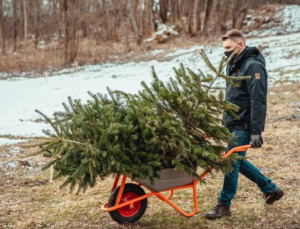 Vilnius, the capital of Lithuania, marked Earth Day (March 20) by planting a brand new Christmas Forest entirely out of old potted holiday trees brought by the residents. The project, first proposed at the beginning of the last holiday season, aims to both contribute to the green transformation of urban areas and involve the community into long-term sustainability-centered initiatives.
Vilnius, the capital of Lithuania, marked Earth Day (March 20) by planting a brand new Christmas Forest entirely out of old potted holiday trees brought by the residents. The project, first proposed at the beginning of the last holiday season, aims to both contribute to the green transformation of urban areas and involve the community into long-term sustainability-centered initiatives.
The idea for a Christmas Forest was suggested by Remigijus Šimašius, Mayor of Vilnius, early in December 2020. Residents were invited to preserve their potted Christmas plants till springtime and were given a set of recommendations on how to keep the trees alive. This March, upon registering for the project, the residents planted the holiday trees in the marked spots with the assistance of Vilnius parks’ maintenance staff.
As a continuous initiative sustained by mutual efforts of the residents and the organisers, the event also provided an opportunity for the residents to spend time outdoors and was organised with all safety precautions in place due to the ongoing lockdown. 80 Christmas trees were planted in the new urban forest located in the territory of Verkiai Regional Park favoured by residents and visitors alike.
“The Christmas trees had to wait to be returned to the forest, however, even if one of five takes root, it is still worth trying out such initiatives. I believe that together with other residents of the city, we will be able to plant as many Christmas trees as possible to put the new forest on the map,” Remigijus Šimašius, Mayor of Vilnius, said. “I also hope this inspires other people to choose the environmentally-friendly option and buy potted trees next holiday season, afterwards donating them to the forest.”
In terms of green urban space, the capital has been recently ranked the greenest city in Europe and the third greenest city world-wide. Using satellite technology, Husqvarna Urban Green Space Index (HUGSI) showed that greenery covers 62% of the capital. However, the expansion of green areas in the city is only one part of the capital’s agenda in encouraging sustainability.
The capital also tackles the waste issue with the help from a combined heat and power plant with the state-of-the-art technology. Since half of the waste generated by an average citizen cannot be recycled, the plant is capable of taking around 160K tons of non-recyclable waste left after the initial recycling process, and transforming it into power and heat. Such sustainability-oriented solution minimizes landfills and puts Vilnius on equal footing with technologically advanced countries that are implementing similar projects, for example, Switzerland or Sweden.
Aside from reducing environmental pollution, Lithuania is also taking steps towards renewable energy, and aims to use renewable sources for producing 100% of the country’s power by 2050. For this reason, the green-thinking capital has presented an interactive map of solar potential within the city to encourage construction of solar power plants and the consumption of sustainable energy. The initiative is aimed at swaying the residents and businesses alike in choosing renewable energy.
With several large and small-scale eco-projects underway, the capital also wants to attract more environmentally-conscious businesses, considering a relocation, and show them that the city’s business environment goes hand in hand with the vision of moving towards higher sustainability and environmental protection.
















